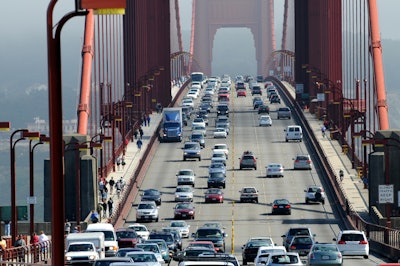 California’s A.B. 5 law, enacted Jan. 1, implements the so-called “ABC test” for determining a worker’s classification — employee or independent contractor. Under the ABC test, most owner-operators would be classified as employees, and fleets would be prohibited from contracting loads with them. CTA and other trucking groups argue the law violates a federal 1994 statute and shouldn’t apply for motor carriers.
California’s A.B. 5 law, enacted Jan. 1, implements the so-called “ABC test” for determining a worker’s classification — employee or independent contractor. Under the ABC test, most owner-operators would be classified as employees, and fleets would be prohibited from contracting loads with them. CTA and other trucking groups argue the law violates a federal 1994 statute and shouldn’t apply for motor carriers.The California Trucking Association, backed by the American Trucking Associations and supported by a coalition of other trucking groups, argued Tuesday in the federal Ninth Circuit Court of Appeals (a court just one level below the U.S. Supreme Court) that motor carriers and owner-operators should remain exempt from California’s restrictive A.B. 5 law.
The law, passed last fall by the California legislature and subsequently signed by Gov. Gavin Newsom, sets limits on what types of workers can be classified as independent contractors, sweeping into that definition owner-operator truckers — both those leased to larger motor carriers and independent owner-operators that haul loads for other carriers.
The law effectively makes it illegal for carriers to contract loads to owner-operator drivers working as independent contractors. But in January, a U.S. District Court issued an injunction that exempts carriers from A.B. 5 while CTA’s lawsuit against the law is adjudicated. The injunction is effectively an exemption that allows motor carriers to continue working with owner-operators until a final decision is reached in CTA’s underlying lawsuit against A.B. 5.
A three-judge panel Tuesday on the Ninth Circuit heard oral arguments from CTA, represented by attorney Andrew Tauber of the D.C.-based firm Mayer Brown, as to why that preliminary injunction should remain in effect. The court also heard oral arguments from the State of California and the Teamsters Union, which is fighting CTA’s case alongside California. The oral arguments took place remotely, with parties dialing in via video conference.
“We’re pleased with how it went,” said attorney Bob Roginson, one of the lead attorneys representing CTA in the case and manager of the Los Angeles office of the national law firm Ogletree, Deakins, Nash, Smoak and Stewart. Roginson heads Ogletree’s transportation and logistics group. “It’s hard to predict with any clarity on where court is headed or what specifically was most important to it. [The judges] had a lot of questions, and I think we handled them very well.”
The court has not given any indication as to when it will issue a ruling, Roginson said, but its decision will likely have years-long ramifications for carriers and independent contractor drivers that work in the state. Ultimately, the lawsuit could take years to make its way through the various courts, potentially all the way to the U.S. Supreme Court — marking the importance of the decision in front of the Ninth Circuit in the case heard Tuesday.
No matter which way the Circuit rules, the decision will likely be appealed to be heard by so-called “en banc,” meaning that the losing side will request a re-hearing by all 12 judges on the Ninth Circuit appellate court. From there, the injunction decision could be appealed to the U.S. Supreme Court.
After a decision is reached about the temporary injunction, the actual lawsuit itself against A.B. 5 – in which CTA seeks a permanent exemption for trucking from the A.B. 5 restrictions – will be heard by the U.S. District Court in Southern California. From there, any decision will likely be appealed to the same Ninth Circuit Court of Appeals that heard the case Tuesday and then, potentially, will be taken to the U.S. Supreme Court.
Roginson and other CTA attorneys argue that a 1994 federal law (the Federal Aviation Administration Authorization Act) expressly prohibits states from enforcing laws that interfere with “prices, routes and services” of interstate motor carriers. California’s A.B. 5 does just that, CTA argues in its case, and thus should not apply to trucking operations in the state.
Though companies like Uber and Lyft have made headlines recently for losing their court cases against A.B. 5’s impact on their operations, those “gig economy” cases “don’t have any real meaningful impact on how the courts are looking at [CTA’s] case,” said Roginson.
The law has already had major ramifications in the state, with fleets large and small late last year announcing a move away from using owner-operators based in California, or even contracting them to haul loads in the state. Notably, Landstar and Prime were major carriers to have reportedly altered their California-based operations in late 2019 in the wake of the law’s passage.



![Prime Utility 3000R Reefer[3]](https://img.ccjdigital.com/files/base/randallreilly/all/image/2014/10/ccj.Prime-Utility-3000R-Reefer3.png?auto=format%2Ccompress&fit=crop&h=167&q=70&w=250)






